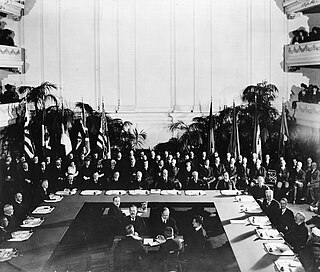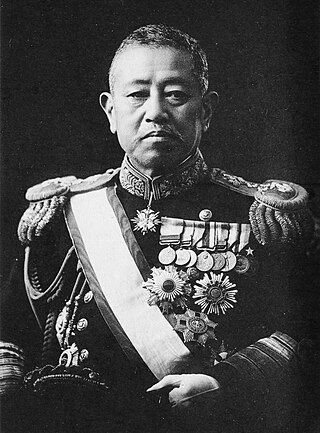The London Naval Conference may refer to:
The Treaty of Washington may refer to:
Treaty of Paris may refer to one of many treaties signed in Paris, France:

Disarmament is the act of reducing, limiting, or abolishing weapons. Disarmament generally refers to a country's military or specific type of weaponry. Disarmament is often taken to mean total elimination of weapons of mass destruction, such as nuclear arms. General and Complete Disarmament was defined by the United Nations General Assembly as the elimination of all WMD, coupled with the “balanced reduction of armed forces and conventional armaments, based on the principle of undiminished security of the parties with a view to promoting or enhancing stability at a lower military level, taking into account the need of all States to protect their security.”

The Washington Naval Treaty, also known as the Five-Power Treaty, was a treaty signed during 1922 among the major Allies of World War I, which agreed to prevent an arms race by limiting naval construction. It was negotiated at the Washington Naval Conference in Washington, D.C. from November 1921 to February 1922 and signed by the governments of the United Kingdom, United States, France, Italy, and Japan. It limited the construction of battleships, battlecruisers and aircraft carriers by the signatories. The numbers of other categories of warships, including cruisers, destroyers, and submarines, were not limited by the treaty, but those ships were limited to 10,000 tons displacement each.
The Treaty of London or London Convention or similar may refer to:

The London Naval Treaty, officially the Treaty for the Limitation and Reduction of Naval Armament, was an agreement between the United Kingdom, Japan, France, Italy, and the United States that was signed on 22 April 1930. Seeking to address issues not covered in the 1922 Washington Naval Treaty, which had created tonnage limits for each nation's surface warships, the new agreement regulated submarine warfare, further controlled cruisers and destroyers, and limited naval shipbuilding.

The Second London Naval Treaty was an international treaty signed as a result of the Second London Naval Disarmament Conference held in London, the United Kingdom. The conference started on 9 December 1935 and the treaty was signed by the participating nations on 25 March 1936.

The Washington Naval Conference was a disarmament conference called by the United States and held in Washington, D.C., from November 12, 1921, to February 6, 1922. It was conducted outside the auspices of the League of Nations. It was attended by nine nations regarding interests in the Pacific Ocean and East Asia. Germany was not invited to the conference, as it had already been disarmed under the terms of the Versailles Treaty. Soviet Russia was also not invited to the conference. It was the first arms control conference in history, and is still studied by political scientists as a model for a successful disarmament movement.

The Anglo-German Naval Agreement (AGNA) of 18 June 1935 was a naval agreement between the United Kingdom and Germany regulating the size of the Kriegsmarine in relation to the Royal Navy.
WNT or Wnt may refer to:
Admiralty most often refers to:
London Protocol can refer to one of many treaties signed in London, England:

The fleet faction was an informal political faction within the Imperial Japanese Navy active in the 1920s and 1930s. The kantai-ha sought to drastically increase the size of the Imperial Japanese Navy in order to reach force parity with the fleets of the United States Navy and Royal Navy in the Western Pacific Ocean. The group advocated for the kantai kessen, a doctrine specifying a need for larger warships and larger-caliber guns.
The term naval conference can refer to various conferences that took place during the early 20th century that aimed to regulate naval warfare and armaments. These agreements were completely abandoned by the time World War II had started in 1939. The following conferences can be included under this definition:
LNT may refer to:
The London Agreement may refer to one of the following agreements signed in London:

A treaty battleship was a battleship built in the 1920s or 1930s under the terms of one of a number of international treaties governing warship construction. Many of these ships played an active role in the Second World War, but few survived long after it.
Washington Agreement or Washington Accords may refer to:
The London Declaration was a declaration issued by the 1949 Commonwealth Prime Ministers' Conference.